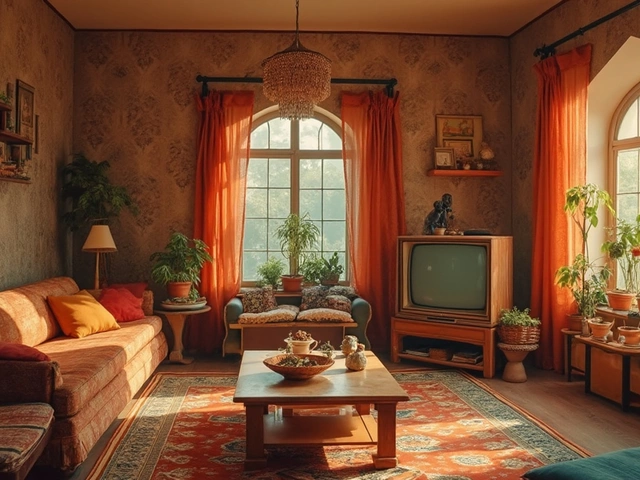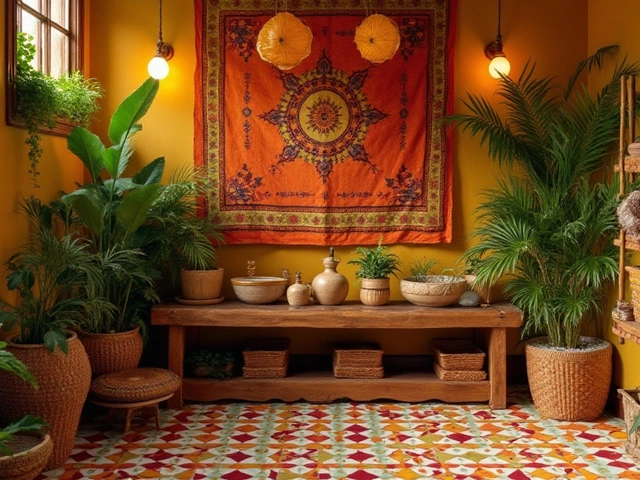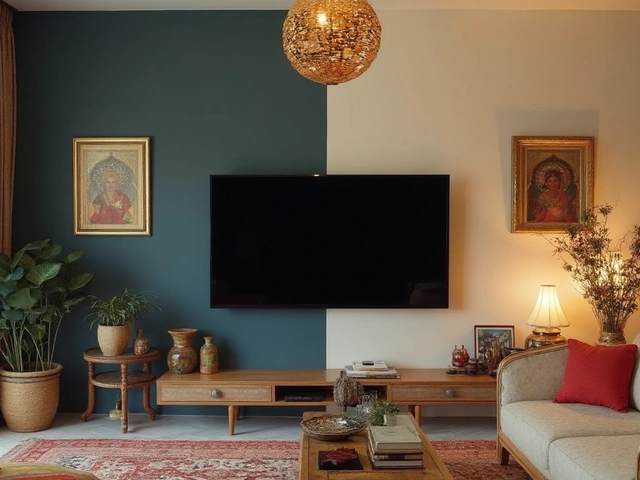Decluttering can feel like an overwhelming task, especially if you've got sentimental attachments to your stuff or just too much to sort through. That's where the 50 rule comes in handy. So, what's the big idea here?
Simply put, the 50 rule is all about keeping only 50% of what you currently own. The goal? Streamline your life by ensuring that everything in your space has a purpose or brings you joy. Think it sounds challenging? It might be at first, but the results speak for themselves—a tidier home and a clearer mind.
But how do you actually go about it? Start small. Pick a room or a category, like clothes or books. Lay out everything, and then start making decisions. Ask yourself: "Have I used this in the last year? Does this item make me happy?" If the answer is no, then it's time to let it go. Donate, sell, or recycle—whatever works best for you.
- What is the 50 rule?
- How to apply the 50 rule
- Benefits of the 50 rule
- Common challenges and solutions
What is the 50 Rule?
The 50 rule is a simple, straightforward approach to solving the clutter problem many of us face. It hinges on the idea of retaining only half of the items you currently own, focusing on those that are truly needed or enjoyed. This way, you're not just removing stuff willy-nilly; you're making intentional choices about what remains in your space.
The Origins of the 50 Rule
While no one is quite sure who first coined the term "50 rule," it has roots in minimalist philosophies aimed at living with less to experience more. By cutting down your possessions, you're supposed to gain a clearer perspective on what truly matters to you.
Breaking Down the 50 Rule
The core principle is simple: keep the best and get rid of the rest. Let's break it down:
- Assess all your belongings in a particular category, such as clothes, books, or kitchen items.
- Decide what items are necessary, frequently used, or bring happiness.
- Aim to end up with just 50% of the items you started with, ensuring that each retained item serves a purpose or sparks joy.
Why the 50 Rule Works
Unlike other decluttering methods, the 50 rule gives you a tangible guideline—keep only half. It forces you to evaluate each item critically, helping you break the emotional hold that leads to clutter. By setting a clear target, it removes the guesswork and helps you stay focused on the task, rather than getting lost in nostalgia or indecision.
What’s fascinating is that when you apply the 50 rule to your entire house, people have found they've unknowingly stashed up more than they thought. Imagine halving your wardrobe or reducing your digital clutter—it’s liberating!
Statistics to Consider
| Category | Average Items Kept |
|---|---|
| Clothes | 50% |
| Books | 50% |
| Kitchen Gadgets | 50% |
As this table shows, applying the 50 rule across different categories can help streamline your life by focusing on keeping only the most meaningful items.
How to Apply the 50 Rule
Jumping into decluttering can be daunting, but the 50 rule breaks it down into an achievable format. First, it's important to prepare yourself mentally. This is not about depriving yourself, but about making space for things that truly matter.
Where to Start?
Begin with a small, manageable space. Some people find success starting with a closet or a bookshelf. Others prefer the kitchen or even the garage. Wherever you start, just remember that this is a journey, not a race.
Steps to Follow:
- Gather Everything: For the area you've chosen, take everything out into a visible space. This way, you know exactly what you're dealing with.
- Sort it Out: Create three piles: Keep, Donate, and Discard. Remember, you're aiming to retain only 50% of what you currently have, so be honest with yourself.
- Make Decisions: Go through each item with a critical eye. Ask yourself key questions like "Have I used this in the last year?" and "Does this bring me joy or is it truly necessary?" If not, it's likely time to let it go.
- Reorganize: Once you've pared down your belongings, it's time to put the 'Keep' items back. Organize them neatly, and make sure everything has a designated spot.
Consistency is Key
This isn't just about a one-time effort, but creating a habit. Apply this process regularly—once every few months is a great way to maintain your progress. By doing so, you'll ensure your home remains a peaceful and organized space.
And remember, the benefits of the 50 rule don't stop at a tidier home. Many find they're able to focus more clearly, save money by avoiding unnecessary purchases, and even experience increased creativity. So, embrace the process, and see where it takes you!

Benefits of the 50 Rule
If you're all about making your home not just look good but also feel good, the 50 rule can be a game changer. Here’s why you might find it really rewarding:
Less Clutter, More Space
By embracing the 50 rule, you'll be surprised by how much space you actually have. Less clutter automatically translates into more room to breathe and move around. Your living space becomes more spacious without the excess baggage.
Boosted Productivity
Believe it or not, reducing clutter can directly impact how productive you feel. An organized environment often leads to a more focused mind, making it easier to tackle daily tasks without constant distractions from unnecessary stuff.
Mental Clarity
It’s not just about the physical space—there’s a mental aspect too. A clutter-free home can help ease anxiety and bring a sense of calm. Knowing where everything is and only owning what’s important can really clear your head.
Financial Benefits
Ready to make a little cash? Selling unwanted items can be a neat side hustle. Plus, when you regularly declutter, you become more mindful of future purchases, ultimately saving money by buying only what you truly need.
Focus on Sustainability
Embracing the 50 rule is a step towards a more sustainable lifestyle. When you choose to keep less and buy less, you reduce waste, which is an eco-friendly move. It's a small personal choice that contributes to a greater environmental impact.
A study once showed that the average household could reduce their cleaning time by approximately 40% just by decreasing clutter. It's amazing how a simple approach can lead to significant improvements in both your home's atmosphere and your daily life.
Common Challenges and Solutions
Tackling the 50 rule for decluttering isn't always smooth sailing. People often face some common hurdles along the way. Let's break them down and see how you can overcome them.
Sentimental Attachments
This might be the number one roadblock for many folks. Letting go of items that hold memories can be tough. The trick here is to prioritize your emotional wellbeing over material possessions. Ask yourself: Does this object genuinely enhance your life? If not, consider taking a photo of it for memory keeping and move on.
Fear of Future Need
That 'just in case' mentality can slow you down. While it's sensible to keep some essentials, hoarding too many 'might need it one day' items ends up suffocating your space. Instead, focus on versatility. Keep things that serve more than one purpose. For instance, a cast iron pan can serve various cooking needs, saving room and clutter.
Overwhelm from Quantity
Feeling lost amidst all your stuff is common. Staring at a mountain of belongings feels daunting, but breaking it into bite-sized tasks helps. Use a timer—set it for 30 minutes. Work diligently on one area. When the timer's up, take a break or switch to another task. Gradually you'll see progress without burnout.
Decision Fatigue
Making tons of tiny decisions can wear you down. If fatigue sets in, use a predefined set of criteria for decision-making. Like the one-year rule: If you haven't used it in the past year, it's probably safe to let it go.
| Challenge | Solution |
|---|---|
| Sentimental Attachments | Keep photos; prioritize emotional wellbeing |
| Fear of Future Need | Focus on versatility; keep multifunctional items |
| Overwhelm from Quantity | Break into small tasks; use a timer |
| Decision Fatigue | Use predefined criteria like the one-year rule |
Decluttering isn't an overnight achievement. The 50 rule offers a clear goal, but challenges are part of the process. Solutions exist for each hurdle, though, so don't let them hold you back. You've got this, step by step!





